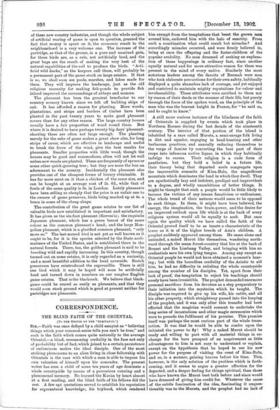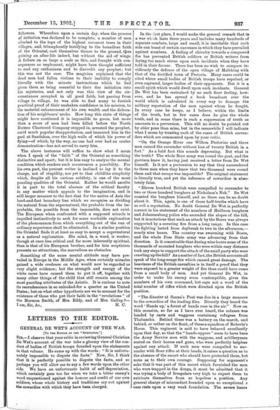CORRESPONDENCE.
THE BLIND FAITH OF THE ORIENTAL.
[TO TIM EDITOR OF THR "SHICTATOR.1 Sr,—Faith was once defined by a child essayist as "believing things which your common-sense tells you can't be true," and such is the faith which comes quite naturally to the average Oriental,—a blind, unreasoning credulity in the face not only of probability but of fact, which joined to a certain persistence of enthusiasm makes the ideal disciple. One of the most striking phenomena to an alien living in close fellowship with Orientals is the ease with which a man is able to impose his own valuation of himself upon his comrades. The present writer has seen a child of some ten years of age dominate a whole countryside by means of a precocious cunning and a phenomenal memory. He learned the Kuriin by heart almost at a first reading, and the blind faith of his fellows did the rest. A few apt quotations served to establish his reputation for supernatural knowledge; his boyhood, which rendered him exempt from the temptations that beset the grown Men around him, endowed him with the halo of sanctity. From such a combination what could result but miracles? And ' accordingly miracles occurred, and were firmly believed in, I being at once the offspring and the foster-children of the I popular credulity. No man dreamed of seeking an explana- tion of these happenings in ordinary fact, since another equally natural and far more attractive reason for them was present in the mind of every native. Similarly the most notorious leaders among the dacoits of Burmah were men who took elaborate precautions for their own safety, habitually displayed a quite shameless lack of courage, and yet enjoyed and contrived to maintain mighty reputations for valour and invulnerability. These attributes were ascribed to them not by reason of their deeds or the manner of their life, but purely through the force of the spoken word, on the principle of the man who was the bravest knight in France, for "he said so, and he ought to know."
A still more curious instance of the blindness of the faith of Orientals is supplied by events which took place in Northern Borneo during the last decade of the nineteenth century. The interior of that portion of the island is inhabited by a race called Muruts, a semi-savage folk living in dirt and squalor, engaging in head-hunting and other barbarous practices, and annually reducing themselves to the verge of famine by converting the best part of their crops into infamous native liquor, in which they habitually indulge to excess. Their religion is a rude form of pantheism, but they hold a belief in a future life, their theory being that departed souls congregate upon the inaccessible summits of Kina-Balu, the magnificent • mountain which dominates the land in which they dwell. They are apathetically lazy and indolent, prodigal and improvident to a degree, and wholly unambitious of better things. It might be thought that such a people would be little likely to become the victims of any insane fanaticism or enthusiasm. The whole trend of their natures would seem to be opposed to such things. In them, it might have been believed, the energy, the imagination, the brain-power, and the desire for an improved outlook upon life which is at the back of every religious system would all be equally to seek. But once again the quality which we have called the faith of the Oriental proved itself to be as innate a characteristic of the lower as it is of the higher breeds of Asia's children. A prophet suddenly appeared among them. He came alone and untended, a naked Murut like themselves, wandering north- ward through the mean forest-country that lies at the back of Brunei and the Limbang Valley, and bringing with him no credentials save his own lying tongue. Among any except an Oriental people he would not have obtained a moment's hear- ing; but with the boundless credulity of the Asiatic, to aid him, he had no difficulty in enlisting the whole countryside among the number of his disciples. -Yet, apart from their lack of proof, the temptation to reject his teachings should surely have been irresistible. The prophet demanded enormous personal sacrifices from his devotees as a step preparatory to their initiation into the mysteries which he taught. The disciple was required to give up his wife, his cattle, and all his other property, which straightway passed into the keeping of the prophet, and it was only after this transfer had been effected that the magician would consent to undertake the long series of incantations and other magic ceremonies which were to precede the fulfilment of his promise. This promise itself was perhaps the most curious part of the whole trans- action. It was that he would be able to confer upon the initiated the power to fly! Why a naked Murut should be ready and willing to part with all material things in ex- change for the bare prospect of an acquirement so little advantageous to him is not easy to understand or explain, except on the hypothesis that he hoped to use his new ' power for the purpose of visiting the crest of Kina-Baln, and so, in a manner, gaining heaven before his time. This, however, is the only solution of the problem which is forth- coming, and it seems to argue a greater affection for the departed, and a deeper feeling for things spiritual, than those who have known the Murut best both before and since would have dreamed of giving him credit for. Whatever the cause of the subtle fascination of the idea, fascinating it unques- tionably was to the Murata, and the prophet had no lack of
followers. Wherefore upon a certain day, when the process of initiation was declared to be complete, a number of men climbed to the tops of the highest cocoanut trees in their villages, and, triumphantly testifying to the boundless faith of the Oriental, cast themselves thence to the ground, tbus gaining an after-life indeed, but without the aid of wings. A failure on so large a scale as this, and fraught with con- sequences so unpleasant, might have been 'thought sufficient to cool any enthusiasm and to discredit any prophet; but this was not the case. The magician explained that the dead men had fallen victims to their inability to comply literally with the minute instructions which he had given them as being essential to their due initiation into his mysteries, and not only was this view of the cir- cumstances accepted in all good faith, but passing from village to village, he was able to find many to furnish practical proof of their unshaken confidence in his mission, to the material enhancement of his own wealth and the disloca- tion of his neighbours' necks. How long this state of things might have continued it is impossible to guess, but more than a score of men had been killed before the North Borneo Chartered Company stepped in, arrested the prophet, amid much popular disapprobation, and immured him in the gaol at Sandakan, over the high walls of which his power of flying—of which, by the way, no one had ever had an ocular demonstration—has not served to carry him.
The above instances will suffice to show what I mean when I speak of the " faith " of the Oriental as something distinctive and apart; but it is less easy to analyse the mental condition which renders such occurrences a possibility. For his own part, the present writer is inclined to lay it to the charge, not of stupidity, nor yet to that childlike simplicity which, despite all his curious subtlety, is one of the most puzzling qualities of the Oriental. Rather he would ascribe it in part to the total absence of the critical faculty in any matter which appeals to the imagination, and in still larger measure to the fact that for the native of Asia the hard-and-fast boundary line which we recognise as dividing the natural from the supernatural, the probable from the im- probable, the possible from the impossible, does not exist. The European when confronted with a supposed miracle is impelled instinctively to seek for some workable explanation of the phenomenon from which everything out of the run of ordinary experience shall be eliminated. In a similar position the Oriental finds it at least as easy to accept a supernatural as a natural explanation. His mind, in a word, is weaker, though at once less critical and far more inherently spiritual, than is that of his European brother, and for him scepticism presents no attractions, the marvellous no obstacles.
Something of the same mental attitude may have pre- vailed in Europe in the Middle Ages, when certainly miracles gained a wide credence on what would now be regarded as very slight evidence; but the strength and energy of the white races have caused them to put it off, together with many other things of the child that still remain among the most puzzling attributes of the Asiatic. It is curious to note its recrudescence in so unlooked-for a quarter as the United States ; but on what other hypothesis are we to amount for the existence of those who put their faith in the " revelations " of the Mormon Smith, of Mrs. Eddy, and of Mrs. Gallup P-



















































 Previous page
Previous page